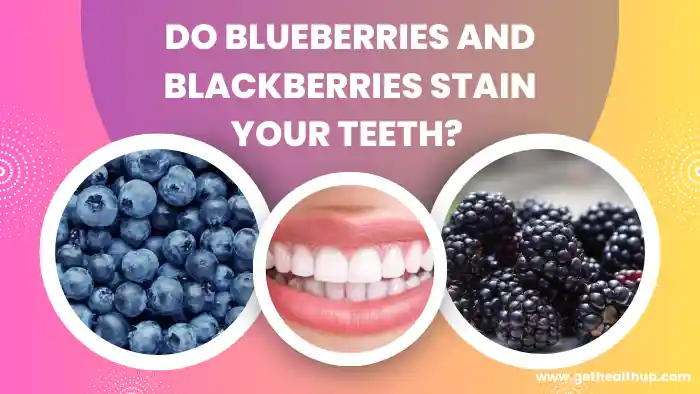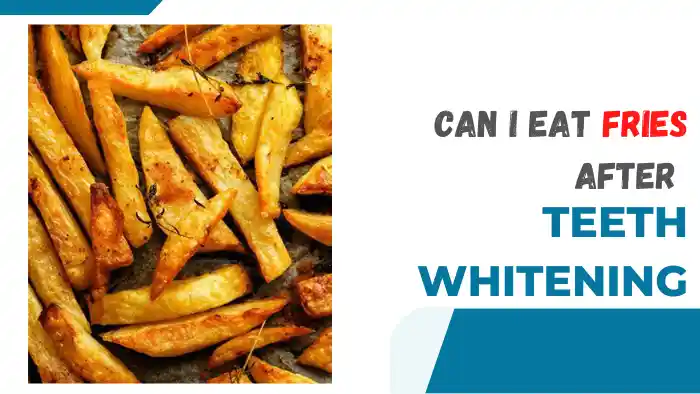Blueberries and blackberries are popular fruits known for their sweet and tangy taste. They are also packed with antioxidants, vitamins, and minerals that offer numerous health benefits.
However, some people hesitate to eat these berries because they may stain their teeth.
So, do blueberries and blackberries stain your teeth? The answer is yes, they can.
These fruits contain dark pigmentation that can penetrate tooth enamel pores, causing discoloration over time.
The staining effect can be more pronounced if you consume these fruits frequently or in large amounts. This can be a concern for those who want a bright, white smile.
How Blueberries And Blackberries Can Cause Discoloration Of Teeth
Blueberries and blackberries, despite being small in size, pack a powerful punch when it comes to staining your teeth. The deep pigments found in these berries are responsible for their vibrant colors, but unfortunately, they can also leave an unsightly mark on your pearly whites.
The main culprits behind tooth discoloration are the natural compounds called chromogens found in blueberries and blackberries. These chromogens have strong pigmentation properties that easily adhere to the enamel of your teeth. Over time, this can result in noticeable stains that range from light yellow to dark brown.
Furthermore, the acidic nature of these berries can contribute to tooth staining as well. The acid erodes the protective layer of enamel on your teeth, making them more susceptible to absorbing pigments from foods and drinks like blueberries and blackberries.
It’s important to note that consuming these berries in moderation is unlikely to cause significant staining. However, if you regularly consume large quantities or eat them over an extended period without proper oral hygiene practices, you may notice gradual discoloration taking place.
To minimize the potential for stains caused by blueberries and blackberries, consider rinsing your mouth with water after eating them to flush away any lingering pigment particles. Brushing your teeth approximately 30 minutes after consumption can also help remove surface stains effectively while safeguarding against enamel erosion due to immediate brushing post-meal.
What Causes Teeth Staining?
There are several factors that cause teeth to stain:
- Food and Drink: Certain foods and drinks, especially those with dark pigments, can stain teeth. Examples include coffee, tea, red wine, berries, and tomato sauce.
- Tobacco Use: Smoking or using tobacco products can make your teeth yellow or brown.
- Poor oral hygiene: If you don’t brush and floss regularly, plaque and tartar can build up on your teeth, staining them.
- Age: As you get older, the outer layer of your tooth enamel wears away, revealing the yellowish dentin underneath.
- Medical Conditions and Medications: Certain medical conditions and medications can also cause teeth to stain. For example, chemotherapy and radiation therapy can discolor teeth.
While there are many factors that can cause a tooth to stain, the good news is that there are also many ways to prevent or reduce it. For example, you can:
- Brush and floss regularly to remove plaque and tartar buildup.
- Use white toothpaste or mouthwash to remove surface stains.
- Avoid or limit foods and drinks known to stain.
- Quit smoking or using other tobacco products.
- Visit your dentist regularly for cleanings and checkups.
By taking these steps, you can keep your teeth looking bright and healthy for years to come.
Blueberries and blackberries: Do they stain your teeth?
Blueberries and blackberries are delicious and nutritious fruits packed with antioxidants and vitamins.
However, many people wonder if these berries stain their teeth.
In this section, we will explore the science behind berry stains and how to minimize staining.
The science behind Berry Stains?

Berries contain dark pigmentation that can stain teeth.
When you eat berries, tiny organic particles can penetrate tooth enamel pores and cause discoloration over time.
The acidity in berries can also weaken your tooth enamel, making it more susceptible to staining.
Blackberries and blueberries have a reputation for staining teeth.
The richly pigmented berries have serious staining potential. The color in these berries can stick to your enamel and cause discoloration.
How do I Minimize Staining?
While it may be tempting to avoid berries altogether to prevent staining, there are several ways to enjoy these delicious fruits without compromising your pearly whites.
Here are some Tips to Minimize Staining:
- Rinse your mouth with water after eating berries to remove the liquid from your teeth.
- Brush your teeth after eating berries to remove any remaining particles from your teeth.
- Use a straw when drinking berry juice to minimize tooth contact.
- Eat cheese or drink milk after eating berries to neutralize the acid.
In addition to these tips, regular dental cleanings and checkups can prevent staining and keep your teeth healthy and bright.
Overall, while blueberries and blackberries can potentially stain teeth, there are ways to minimize the risk and still enjoy the many health benefits of these delicious fruits.
Tips For Preventing Or Reducing Stains From Berries
Berries are not only delicious, but they also pack a powerful punch of antioxidants and vitamins. However, their vibrant colors can leave behind unsightly stains on your teeth. If you’re a fan of blueberries and blackberries but want to maintain a pearly white smile, here are some tips to help prevent or reduce stains:
- Rinse your mouth: After enjoying berries, make it a habit to rinse your mouth with water immediately. This will help wash away any residue that could potentially stain your teeth.
- Brush after meals: Incorporate brushing into your daily routine following meals that include berries. Brush gently using fluoride toothpaste to remove any surface stains.
- Use baking soda: Baking soda is known for its natural whitening properties. You can mix a small amount with water and use it as toothpaste occasionally to help combat berry stains.
- Drink through a straw: When consuming beverages like berry smoothies or juices, consider using a straw to minimize contact between the liquid and your teeth.
- Eat cheese afterward: Eating cheese after consuming berries can neutralize acids in the mouth and promote saliva production, which helps cleanse the teeth.
Professional Teeth Whitening Options
When it comes to removing stubborn stains and achieving a brighter smile, professional teeth whitening options are worth considering. Unlike over-the-counter products that may provide limited results, professional treatments offer more effective and long-lasting solutions.
One popular option is in-office teeth whitening performed by a dental professional. This procedure involves applying a bleaching agent directly onto the teeth and using special light or heat to activate the whitening process. The entire treatment typically takes about an hour and can significantly lighten the shade of your teeth.
Another option is take-home kits provided by your dentist. These kits include custom-made trays that fit snugly over your teeth, along with a professional-strength bleaching gel. You’ll wear these trays for a specified amount of time each day until you achieve your desired level of whiteness.
For those seeking convenience, some dentists also offer laser or light-accelerated treatments that enhance the effectiveness of the bleaching agents used during in-office or at-home treatments. These methods can expedite the whitening process and deliver noticeable improvements in just one session.
It’s important to consult with your dentist before undergoing any professional teeth whitening procedure as they will evaluate your oral health condition and recommend the most suitable treatment option for you. Remember, maintaining good oral hygiene habits alongside periodic touch-up treatments can help prolong the effects of professional teeth whitening.
Conclusion
In conclusion, blueberries and blackberries stain teeth due to their dark pigments.
However, this does not mean avoiding these nutritious fruits altogether.
There are several ways to minimize blueberries and blackberries’ staining effects, such as:
- Rinse the mouth with water after consuming these fruits to remove any residue that may stain.
- Consume these fruits in moderation and do not overindulge in them.
- Brushing and flossing regularly to remove surface stains.
- Use whitening toothpaste or professional teeth whitening treatments to remove stubborn stains.
It is imperative to note that, while blueberries and blackberries may stain teeth, they also offer numerous health benefits.
These fruits are rich in antioxidants and vitamins, which can boost the immune system and improve overall health.
Therefore, individuals who consume blueberries and blackberries should not be overly concerned about staining effects and should continue to include these fruits in their diet.
By following the aforementioned tips, one can enjoy the health benefits of these fruits while minimizing potential staining effects on teeth.
Frequently Asked Questions:
Do blueberries and blackberries stain your teeth?
Yes, blueberries and blackberries can stain your teeth due to their dark pigments. These fruits contain compounds called anthocyanins, which give them their vibrant colors but also have the potential to cause discoloration on tooth enamel.
How do berries cause tooth stains?
The intense pigmentation in blueberries and blackberries can adhere to the porous surface of tooth enamel, leading to stains over time. Additionally, these fruits are acidic, which can weaken the enamel and make it more susceptible to staining.
What other foods and drinks can stain teeth?
Besides blueberries and blackberries, several other food items can contribute to dental staining including coffee, tea (especially darker varieties), red wine, cola beverages, tomato sauce, soy sauce, balsamic vinegar, beets, curry spices like turmeric,
and certain candies such as those containing artificial coloring.
Can brushing immediately after consuming berries prevent stains?
It’s best not to brush your teeth immediately after eating berries as the acidity from these fruits may soften the enamel temporarily, making it more prone to damage from brushing. Instead, rinse your mouth with water or chew sugar-free gum for a few minutes before brushing about 30 minutes later.

A Blogger, Author and Researcher! Gohar Aalam is recognized as a full-time blogger for Health and Tech Niches. I’m a Fountainhead of Gethealthup.com, will provides high quality knowledge.









